
THE VOICE OF INTERNATIONAL LITHUANIA
|
VilNews has its own Google archive! Type a word in the above search box to find any article.
You can also follow us on Facebook. We have two different pages. Click to open and join.
|
Archive for February, 2012
- Posted by - (2) Comment
Why dignity matters for Lithuania

Jonas
Basanavičius (23 November 1851 – 16 February 1927) was an activist and
proponent of Lithuania's National Revival and founder of the first Lithuanian
language newspaper Aušra. He was a signatory of the Act of Independence of
Lithuania on 16 February 1918 Basanavičius is often given the unique informal
honorific title of the "Patriarch of the Nation" for his
contributions and help in re-establishing the Lithuanian state.
By Aage Myhre, Editor-in-Chief
aage.myhre@VilNews.com
“A
man's country is not a certain area of land, of
mountains, rivers, and woods,
but it is a principle; and
patriotism is loyalty to that principle.”
- George William Curtis
It is 16 February 2012. It is today exactly 94 years since a group of brave men wrote the Lithuanian declaration of independence after the country had been under Tsarist Russia's iron heel through more than 100 years. These men represented a generation that certainly felt an overwhelming sense of pride at the dawn of renewed independence. The Act of February 16 was signed by all 20 representatives of the Council of Lithuania, proclaiming the restoration of an independent State of Lithuania, governed by democratic principles. The meeting and signing procedures were chaired by Jonas Basanavičius, the man often given the unique informal honorific title of the "Patriarch of the Nation" for his contributions and help in re-establishing the Lithuanian state.
What these men presented from the balcony of a house in Pilies street here in Vilnius Old Town was not much more than a piece of paper. But it was a paper that symbolized a nation willing to throw off the yoke. A nation that had won back its self respect and dignity in spite of the injustice and oppression that had been going on since the Russian occupation started in 1795.
We salute these men for their courage and foresight. We salute them because they, in faith, hope and dignity clearly showed that Lithuania wanted to live up to its proud history as a nation of greatness.
Great nations are founded on self-belief!
As we now know, the newfound freedom was not going to last much more than 20 years. But they were 20 important years in which Lithuanians showed the world and themselves that the citizens and the country's leaders had the ability to collaborate an utterly successful reconstruction of the nation. Pride, dignity and courage came to characterize the inter-war years of this country.
The years 1988-1991 were also characterized by dignity and confidence. The quiet revolution that defined the Lithuanian and the other Baltic States' revolt against Soviet rule was almost like a textbook on how a nation's inner strength can lead to freedom originating from within, from its own citizens.
The 21 years that have passed since 1991, have not in the same good way as the 21 inter-war years demonstrated a nation where citizens have regained pride and commitment to joint efforts for the home country. Distrust, corruption and greed has unfortunately become all too characteristic of the last two decades. Hundreds of thousands have left
Lithuania during these years, frustrated by the absence of expected progress, of seeing that cheating on many levels is still going on, and that a small minority have made themselves rich at public expense.
It is in this situation easy to blame the nation's leaders. And for good reason. But the country's own citizens, especially the young, should be united in a common effort and take responsibility for a better future. Politicians and leaders should show the way, but the exertion must come from within, from the people.
"Ask
not what your country can do for you –
ask what you can do for your country."
-
John F. Kennedy's Inaugural Address, January 20, 1961
VilNews wants to contribute to the cause of supporting the Lithuanian people, wherever in the world they are located, to once again feel pride and enjoyment of their homeland. We would like to see many of those who have emigrated and their descendants to return home again. We want to see a joint effort for the home country among Lithuanians all over the world. We want the team feeling back.
Patriotism, pride and dignity are important elements in order for such efforts to succeed. We have, with this as background, invited a group of prominent individuals who represent dignity and patriotism in an outstanding manner. They are all born in Lithuania before World War II, a period when Lithuania flourished. Some of them have lived most of their lives in this country while others fled to western countries when Stalin's war machinery rolled into their homeland.
Common to them all, however, is that they continuously have fought for the fatherland, wherever in the world they have been living or working.
On this very special day for Lithuania, the 16th of February, it's a great pleasure to honour and thank these individuals for their tremendous efforts and attitudes to the homeland. They have something to teach us. They have, through the way they have lived their lives, and their wisdom, something important to share with all of us who are related to Lithuania.
They represent the sort of dignity and patriotism that we all should let us inspire by and follow.
|
Statement from the VilNews Honorary Council
We, the undersigned have accepted the honour of becoming members of VilNews e-magazine’s Honorary Council because we fully support VilNews as a free, independent, serious, and honest publication with the noble goals of connecting people around the globe with ties to Lithuania by giving them a forum and voice so they can actively participate and dialogue with the homeland and each other. Our beloved Lithuania is undergoing difficult times. We wish to foster a greater appreciation of what our proud and honourable nation and our people, both at home and abroad, truly represent. We, the members of the Honorary Council, wish to contribute, embody, and set standards that enhance the progress and development of Lithuania as a great nation based on dignity, wisdom, tolerance, multiculturalism, and respect for each other. We invite everyone with ties to Lithuania to participate and get actively involved in support of these noble goals, both through dialogue and mutual cooperation. We are proud to state that Lithuania today is a free and independent nation with norms, values, and visions that are deeply rooted in our country’s long and proud history, and it is these outstanding qualities that define our country and our people as the nation called Lithuania. These are the traits that have made Lithuania a great, progressive, and prosperous force in human history. Now our nation needs to pull together so that we can confront boldly the challenges we face and take responsibility for our own future again. Our participation in the Honorary Council does not imply that we, either as a group or as individuals, necessarily agree with all of the opinions the publication’s editorial staff, readers, and other parties may express in articles, comments, or other published content, but we do affirm and advocate freedom of the press, speech, and other forms of legitimate expression as among the inviolable rights of a democratic Lithuania, based on the ethical standards outlined in the publication’s own “Code of Ethics” (ref VilNews Section 3). We encourage Lithuanians and readers around the world to express their opinions and views through VilNews with the common goal of contributing to a better and more prosperous future for the worldwide Lithuanian community and the nation called “Lithuania!” Irena
Veisaite – Valdas Adamkus – Jonas Kronkaitis – Stasys Backaitis
|
Why is dignity important for Lithuania?
For me dignity has to do with the feeling of self-worth. Something every person and nation needs to have to succeed and feel good. Still my experience is that in spite of its universal appeal, this remains a topic rarely discussed. We all have experience of it but may not have words to describe it or a wish to talk about it.
We all know how great it is to be seen, heard, and acknowledged for who we are and treated as if we mattered. Who doesn't enjoy the praise of being recognized for doing a good job or being honoured for going beyond the call of duty?
We also know what it feels like to be treated as inferior, discriminated against, ignored, misunderstood, criticized and excluded. There is little worse than being in a situation where you are treated unfairly and can do nothing about it, or being excluded from something that means a lot to you.
We are all too well aware of the feelings that accompany these violations of our dignity. What is not so common is to bring them up for discussion. It is often too embarrassing to admit that we have been treated so badly. It is why attention on matters of dignity and to give us a language to bring these issues to the surface so that we can legitimize the suffering that accompanies these painful human experiences and do something about them.
We don't have to just live with them, we need to address them. So does the nation called Lithuania.
Matters of dignity are at the heart of every interaction we have with other people or nations. They show up in the work, in schools, at home, in intimate relationships – everywhere human beings come into contact with one another. All over the world dignity violations abound. In work or social relations people often feel that they are not treated well, but have no way to "speak-up" for fear of retribution. Many feel it would be career suicide to go to their bosses and tell them that they have violated their dignity. The end result is that there is a lot of resentment on the part of employees and little desire to extend themselves beyond what their job requires. It is infuriating to them that they are being mistreated and that there is no way to give voice to it. Conflicts over dignity are an everyday experience but very few people feel skilled in handling them.
This is why I think matters of dignity are of highest importance both for and within Lithuania. The time has come to shed light on something that we may not have either the courage or language to discuss. The shame that accompanies being treated badly prevents us from doing the very thing we need to do to recover from violations of our dignity: bring them out into the open, validate them, and give them the attention they deserve.
We wouldn't think twice about getting help when we have a physical injury. When we have a wound to our dignity there is nowhere to go; no emergency call or room. Bringing the issue to light can help us all heal from the many subtle and not so subtle ways that indignity has found its way into our lives.
We, Lithuania, can do better and we should do it with dignity.
“Dignity does not float down from heaven it cannot be
purchased nor manufactured. It is a reward reserved for those who labour with
diligence.”
- Bill Hybels
- Bookmark :
- Digg
- del.icio.us
- Stumbleupon
- Redit it
- Posted by - (0) Comment
 |
 ONE YEAR ONLINE! |
VilNews Honorary Council!
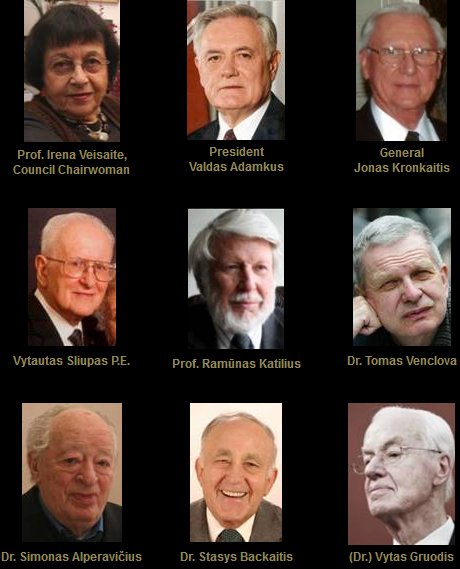
By: Aage Myhre, Editor-in-Chief
aage.myhre@VilNews.com
Dear VilNews readers,
We are today proud to present you to our ‘Honorary Council’ – composed of distinguished individuals, all born in Lithuania before World War II, all having extraordinary lives and careers – some in Lithuania, some in exile due to the Soviet occupation of their motherland.
The members of the Honorary Council, wish to contribute, embody, and set standards that enhance the progress and development of Lithuania as a great nation based on dignity, wisdom, tolerance, multiculturalism, and respect for each other.
Lithuania is today a free and independent nation with norms, values, and visions that are deeply rooted in our country’s long and proud history, and it is these outstanding qualities that define the country and our people as the nation called Lithuania. These are the traits that have made Lithuania a great, progressive, and prosperous force in human history.
Now our nation needs to pull together so that we can confront boldly the challenges we face and take responsibility for our own future again.
The dignitaries participation in the Honorary Council does not imply that they, either as a group or as individuals, necessarily agree with all of the opinions the publication’s editorial staff, readers, and other parties may express in articles, comments, or other published content, but they do affirm and advocate freedom of the press, speech, and other forms of legitimate expression as among the inviolable rights of a democratic Lithuania, based on the ethical standards outlined in the publication’s own “Code of Ethics” (ref VilNews Section 3).
They encourage Lithuanians and readers around the world to express their opinions and views through VilNews with the common goal of contributing to a better and more prosperous future for the worldwide Lithuanian community and the nation called “Lithuania!”
Irena Veisaite – Valdas Adamkus – Jonas Kronkaitis – Stasys Backaitis
Vytautas Slliupas – Tomas Venclova – Romas Katilius – Siminoas Alperavicius – Vytas Gruodis
TO READ MORE, GO TO OUR SECTION 2
* * *
VilNews became an online e-publication
15th of February 2011
* * *
Today: 250.000 readers in 175 countries
in absolutely all world corners!
* * *
If VilNews was printed on paper, it would become
a book of more than 6.000 pages
* * *
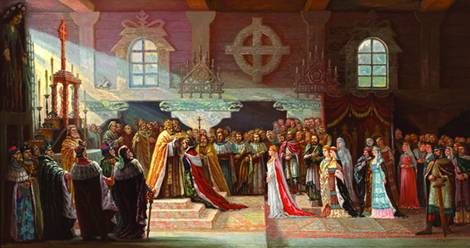
Coronation of King Mindaugas, Lithuania’s first and only king, 6 July 1253.
“The Coronation of King Mindaugas” is the only historical picture out of half a
thousand works that were painted by Adomas Varnas (1879-1979). Varnas was
Lithuanian, a graduate of the Krakow Academy of Fine Arts and the Geneva
High School of Painting, and lived abroad most of his life. He worked on
the painting of King Mindaugas in Chicago, USA. The size of the picture is
1,65 m x 1,3 m. It portrays the climactic scene of the King’s coronation.
Varnas painted the canvas when he was over 70 years of age, in 1952.
He consulted several scientists to avoid historical mistakes.
VilNews went online 15 February 2011. Our goal was to get 100,000 visitors in one year. This target was reached already after six months, and now, after one year, we are very pleased to announce that we have reached 250,000 visitors – one quart million readers in no less than 175 countries! Around 1,000 persons are now reading VilNews every single day, a new reader every 1,5 minute in other words…
Experts told us in advance that a ‘niche product’ like this could expect a readership of 10,000 – 15,000 per year. Skeptics said that we were too optimistic. They were thoroughly wrong …
VilNews is a unique combination of blogs, news, historical articles, etc – a news media and social media under same umbrella, including a huge information base providing background articles on history, politics, economy and much more.
As far as we know VilNews is now the world’s most comprehensive online presentation of Lithuania and Lithuanian topics, be it with regard to history, politics, economy, culture, tourism and more. Had VilNews been printed on paper it would be a book of more than 6,000 pages, thicker than the Bible, Old and New Testament together.
To make reading easier, we have divided VilNews into 24 specialty sections. Below we have described them all. To get to the sections you can now today simply press the LEARN MORE buttons to the right, but normally you have to use the buttons on top of the front page of VilNews.
Note also the search box at the top of the front page. Enter any keyword and click SEARCH to find articles from our very extensive archive.
- Bookmark :
- Digg
- del.icio.us
- Stumbleupon
- Redit it
- Posted by - (0) Comment
February 16, 1918
Act of independence

Facsimile of the Act of February 16
Dear readers,
Two of the most significant dates for Lithuania in the 20th Century were February 16, 1918 when Lithuania declared its independence from Imperial Russia by signing the Act of Independence of Lithuania and March 11, 1990 when the Act of the Re-Establishment of the State of Lithuania was signed which re-established the country’s freedom from Soviet Russia. We would like to share with you some of the situations that existed at this time and events that took place leading up to February 16, 1918 and the aftermath of this historical event.
Su pagarbe
Vincas Karnila
Associate editor
To read the article, go to our SECTION 10
See also picture at top of SECTION 9
- Bookmark :
- Digg
- del.icio.us
- Stumbleupon
- Redit it
- Posted by - (0) Comment

Despite years of war and Soviet occupation, the people of Lithuania have demonstrated what democracy can deliver to its people. On my two trips to Vilnius last year, I saw firsthand the progress that has been made. The United States and Lithuania share a long history as partners and friends, and today our countries are dedicated to promoting the ideals of democracy, human rights and rule of law, and we are working hard to create a safer future for all our people. We look forward to continuing to work with Lithuania as we tackle some of the world’s most challenging issues together.
The United States joins all citizens of Lithuania as you celebrate Lithuania’s independence and the inspiration it provides to countries around the world. Know that the United States stands with you as a dedicated ally and a friend as we work towards a more peaceful and prosperous world.
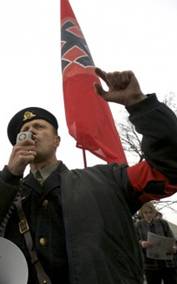
Lithuania 2011:
A neo-Nazi leader shouts menacing slogans in a megaphone next to police cordons at Baltic Pride. Although it is illegal to display a swastika in Lithuania, the police would not take away the group’s flags.
Photo: http://www.lgbt-ep.eu
As Lithuanian national holidays – February 16 and March 11 – are approaching, Lithuanian Minister of Foreign Affairs Audronius Azubalis urges the participants of the planned patriotic march "to overcome radicalism and rally around the tricolour", reported BC the MFA.
"During the national holidays, let us emphasize not our differences and ambitions, but public spirit and maturity in freedom. Public spirit, as you know, is determined not by the length of the hair, exclusive attitude or ethnic background. It is the outer manifestation of respect of Lithuania and its people," Azubalis said.
Participants of the march must make it clear and understandable that the love of one's fatherland has nothing to do with neo-Nazism or xenophobia. – One should not confuse the love of homeland with specific personal desires," the minister says.
He stresses that public holidays are for all Lithuanian citizens regardless of their background or attitude. "There should be no outcasts. On those days we must not forget the colours that are most important and we should not discard it for the interest of some group," Azubalis said.
The minister believes that the Lithuanian society "has always been and will be a dynamic, sustainable, and patchy fabric". Therefore, the patriotic march must demonstrate that there are more uniting threads than dividing ones in our society.
"Let us not give reason to defame Lithuania under the pretext of racism, xenophobia and Nazism. We have to express the love of our country responsibly and evaluate the impact of personal emotions," the minister says.
Read more...
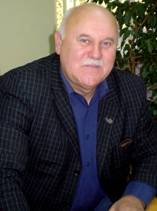
Rimantas Uzumeckas, principal of Upyna Secondary School of Silale.
By Linas Jegelevicius
TAURAGE, Lithuania | As a secondary school teacher, Lina Baltiene used to earn almost $800 a month, the average national wage, and she received another $100 to cover bus fare for the 30-kilometer (19-mile) ride to her school in the countryside.
What a difference a few years makes.
Now working part time, she‘s lucky if she makes one-third of her old salary. Gone is the perk of bus fare, though she still has to make the same daily trek, without a car of her own.
In some ways, Baltiene is a symbol of a shakeup in Lithuanian education spurred by the financial crisis and dramatically shifting demographics.
As in many countries, local governments in Lithuania used to offer incentives to teachers to work in rural communities. Those who commuted were reimbursed for transportation expenses; those who moved close to their schools received more generous benefits.
“Before the crisis, we would rent out apartments and even houses, and pay the rent for the teachers from town,” said Rimantas Uzumeckas, principal of Upyna Secondary School in the western district of Silale. Other benefits included free firewood and cut-rate school meals.
“Even villagers would treat them really well. Some local dairy farmers would provide the newcomers with milk,” Uzumeckas said.
“Now, forget it.”
Read more…
“Good life does not come easily in Lithuania”

At the airport in Vilnius.
In a time of crisis with high unemployment, young Lithuanians are following in the footsteps of their emigrant ancestors. Tens of thousands have left the country in search of a better life, mainly in the British Isles and Scandinavia. The weekly Veidas reports.
Read more...

Dialogue of the deaf between Vilnius and Warsaw
OUTSIDERS find the Polish-Lithuanian spat the most incomprehensible in Europe. How come two countries with so much common history and so many common interests get on so badly? Is it just the appalling personal chemistry between some senior officials? Or is it, absurdly, about spelling? Poles in Lithuania want to spell their names using letters like ł and ę in official documents. (We can't use them, or most other diacritics, in the print edition of the Economist because our typeface doesn't have those characters).
I have not met any Lithuanian, even on the nationalist fringe, who believes that the authorities in Vilnius have handled this issue absolutely perfectly from the very beginning. Lithuanian politicians have habitually promised more than their parliamentarians are willing to vote for, or their officials are able to implement. It is easy to see why Poles feel cross about that.
Read more...
A planned gas pipeline between Poland and Lithuania may cost 471 million euros ($625 million), the Baltic News Service reported today, citing Slawomir Sliwinsky, board member of Poland’s Gaz-Systems.
The 562-kilometer pipeline is projected to be completed in 2018, which would supply the Baltic region with 2.3 billion cubic meters of gas a year, the newswire said. Gaz-Systems and Lithuania’s gas utility Lietuvos Dujos AB (LDJ1L) plan to receive financing for the project from the European Commission, it said.
To contact the reporter on this story: Milda Seputyte in Vilnius at mseputyte@bloomberg.net
To contact the editor responsible for this story: Balazs Penz at bpenz@bloomberg.net
Read more...
- Bookmark :
- Digg
- del.icio.us
- Stumbleupon
- Redit it
- Posted by - (0) Comment
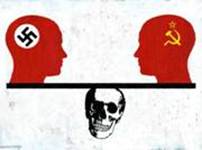 “DOUBLE GENOCIDE” |
The "Double Genocide theory" is a concept about the equality of the Holocaust and Communist crimes against humanity. The term was used by associate professor of political science Dovilé Budryté in 2004 in a study of Lithuanian memory politics with regard to Soviet and Nazi repression, where the view held by a segment of that country since before the restoration of independence in 1991 was that Lithuanians similarly suffered genocide under Soviet rule. Recent critics of this Lithuanian viewpoint, Dovid Katz and Efraim Zuroff, have argued that the country has presented a false “double genocide” thesis and its argumentation obfuscates the Holocaust.
------------------------------------------------------------------------------------------------------------------------------------------------------------------------
 Roger Cohen |
 |
‘The Suffering Olympics’
By ROGER COHEN
Published: January 30, 2012
VILNIUS, LITHUANIA — The “double genocide” wars that pit Stalin’s crimes against Hitler’s are raging in wide swathes of Europe and every now and again along comes a gust from the past to stoke them. The 70th anniversary this month of the Nazi adoption at Wannsee of annihilation plans for the Jews provided one such squall.
Yes, the past is still treacherous beneath Europe’s calm surface. Memory swirls untamed in the parts of the Continent that the American historian Timothy Snyder calls “Bloodlands,” the slaughterhouses from Lithuania to Ukraine that Hitler and Stalin subjected to their murderous whim.
To mark the Wannsee anniversary, over 70 European Parliament members, including 8 Lithuanians, signed a declaration objecting to “attempts to obfuscate the Holocaust by diminishing its uniqueness and deeming it to be equal, similar or equivalent to Communism.” It also rejected efforts to rewrite European school history books “to reflect the notion of ‘double genocide.”’
All of this was too much for the Lithuanian foreign minister, Audronius Azubalis, a conservative, who blasted the Lithuanian social democrat signatories as “pathetic.” His spokeswoman declared that the only difference between Hitler and Stalin was the length of their mustaches. She said legal qualifications of the crimes they committed were “absolutely the same”: genocide, war crimes and crimes against humanity.
------------------------------------------------------------------------------------------------------------------------------------------------------------------------
Three major flaws mar
Mr. Cohen’s attempt

Boris Bakunas
By: Dr. Boris Vytautas Bakunas, Ph.D.
"Mr. Cohen may appear to make a sincere effort to present a balanced view in his article; however, three major flaws mar his attempt. First, the article is based on the logical fallacy of false dichotomy, also known as the either-or fallacy. Second, the scales of balance in Mr. Cohen’s presentation waver as a result of his failure to present all the relevant facts related to the establishment of The Museum of Genocide Victims in Vilnius. Finally, Mr. Cohen obfuscates two crucial terms: Holocaust and genocide.
------------------------------------------------------------------------------------------------------------------------------------------------------------------------
- Bookmark :
- Digg
- del.icio.us
- Stumbleupon
- Redit it
- Posted by - (2) Comment
“DOUBLE GENOCIDE”
Three major flaws mar
Mr. Cohen’s attempt

Boris Bakunas
By: Dr. Boris Vytautas Bakunas, Ph.D.
"Mr. Cohen may appear to make a sincere effort to present a balanced view in his article; however, three major flaws mar his attempt. First, the article is based on the logical fallacy of false dichotomy, also known as the either-or fallacy. Second, the scales of balance in Mr. Cohen’s presentation waver as a result of his failure to present all the relevant facts related to the establishment of The Museum of Genocide Victims in Vilnius. Finally, Mr. Cohen obfuscates two crucial terms: Holocaust and genocide.
First, let us consider Mr. Cohen's portrayal of Post-Soviet historiography as a series of "faltering attempts to deal with a thorny question: Were Lithuanians chiefly perpetrators (of Nazi crimes against Jews) or victims (of Soviet crimes against the nation)?" By posing his question in an either-or fashion, Mr. Cohen tacitly assumes that an entire nation can be characterized as falling within the one of two mutually exclusive categories: perpetrators or victims. In point of fact, some Lithuanians collaborated with their Nazi overlords, while others rescued Jewish Lithuanians at the risk of their own lives and those of their children. Individual accounts of their heroic deeds can be found in Gilbert Martin's excellent book "The Righteous: The Unsung Heroes of the Holocaust." Characterizing an entire group based solely on the actions of its worst or even its best representatives results in ethnic stereotyping, which clouds judgment and inflames passion.
Mr. Cohen also claims that The Museum of Genocide Victims in Vilnius “reflects a still-skewed national psyche” because it is devoted to Soviet crimes against Lithuanian partisans and not to the Jewish victims of the Nazis. Yet he fails to mention two important facts. The Vilnius Genocide Museum occupies the former KGB headquarters where Lithuanian partisans and others judged to be enemies of the Communist regime were imprisoned and tortured, while the Nazi genocide against Lithuanian Jews is memorialized in Kaunas’ 9th Fort Museum, where the Jewish people of Lithuania in the thousands were massacred. By selectively presenting only one relevant fact, Mr. Cohen slants his article towards a particular point of view.
Mr. Cohen's third error resides in confusing the terms Holocaust and genocide. The Holocaust was indeed a unique event -- in the same way that the Holodomor, the systematic famine engineered by Stalin in 1932-33 in which up to 10 million Ukrainians perished as well as the Massacre of Armenians during and right after the First World War were unique events. All instances of systematic mass murder are events unique to a particular time, place, and historical context. And all fall within the bounds of the superordinate concept of genocide.
The term "genocide" was first coined by Raphael Lemkin, a Polish lawyer of Jewish descent who lost 49 relatives during the Holocaust. After the war, Mr. Lemkin tirelessly campaigned for the establishment of international laws defining and forbidding genocide. In many of his writings and during many public appearances, Mr. Lemkin emphatically stated that genocide was a broad term that encompassed many
In his book “Axis Rule in Occupied Europe,” Mr. Lemkin wrote that "Genocide has two phases: one, destruction of the national pattern of the oppressed group; the other, the imposition of the national pattern of the oppressor. This imposition, in turn, may be made upon the oppressed population which is allowed to remain or upon the territory alone, after removal of the population and the colonization by the oppressor's own nationals." Clearly, the execution, torture, and mass deportations of Lithuanians by Soviet invaders fall within the scope of genocide.
Mr. Cohen’s dichotomous characterization of Lithuanians as either perpetrators or victims, his failure to present the full facts related the memorialization of genocide victims in present-day Lithuania, and his failure to understand the difference between the Holocaust and genocide gives a skewed report of independent Lithuania’s recognition of the Nazi and Soviet crimes against humanity. A little more thought and less hasty writing may have resulted in an article that enlightens rather than inflames this issue.
- Bookmark :
- Digg
- del.icio.us
- Stumbleupon
- Redit it
- Posted by - (0) Comment
“DOUBLE GENOCIDE”
 Roger Cohen |
 |
 |
‘The Suffering Olympics’
By ROGER COHEN
Published: January 30, 2012
VILNIUS, LITHUANIA — The “double genocide” wars that pit Stalin’s crimes against Hitler’s are raging in wide swathes of Europe and every now and again along comes a gust from the past to stoke them. The 70th anniversary this month of the Nazi adoption at Wannsee of annihilation plans for the Jews provided one such squall.
Yes, the past is still treacherous beneath Europe’s calm surface. Memory swirls untamed in the parts of the Continent that the American historian Timothy Snyder calls “Bloodlands,” the slaughterhouses from Lithuania to Ukraine that Hitler and Stalin subjected to their murderous whim.
To mark the Wannsee anniversary, over 70 European Parliament members, including 8 Lithuanians, signed a declaration objecting to “attempts to obfuscate the Holocaust by diminishing its uniqueness and deeming it to be equal, similar or equivalent to Communism.” It also rejected efforts to rewrite European school history books “to reflect the notion of ‘double genocide.”’
All of this was too much for the Lithuanian foreign minister, Audronius Azubalis, a conservative, who blasted the Lithuanian social democrat signatories as “pathetic.” His spokeswoman declared that the only difference between Hitler and Stalin was the length of their mustaches. She said legal qualifications of the crimes they committed were “absolutely the same”: genocide, war crimes and crimes against humanity.
- Bookmark :
- Digg
- del.icio.us
- Stumbleupon
- Redit it
- Posted by - (0) Comment
Lithuania is now a preferred
gateway to the EU for:
Japan – China – India
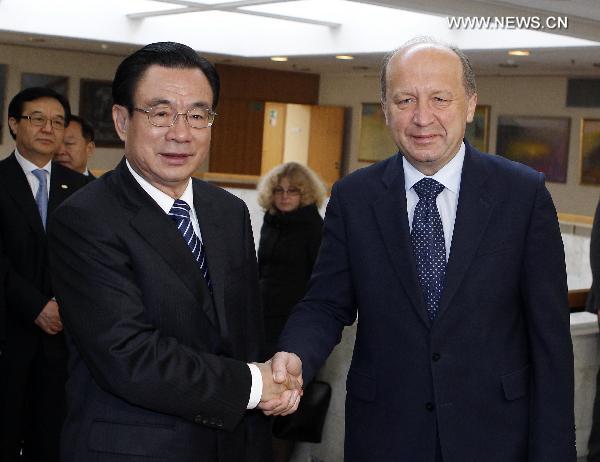
Lithuania is "China's important trading partner in the Baltic Sea region," He Guoqiang, member of the Standing Committee of the Political Bureau of the CPC Central Committee and secretary of the CPC's Central Commission for Discipline Inspection, said during this meeting with Lithuanian Prime Minister Andrius Kubilius.
The Lithuanian government has made several wise moves during the past year. One has connected ever-stronger ties to Scandinavia and Finland, another one is that there has been an increasing number of contacts made to Asian countries, especially with regards to China, India and Japan.
The agreements that are negotiated, or are under development, are highly significant and may give Lithuania a key position as a link between Asia and EU.
The agreements represent all win-win situations for bilateral relations between the three countries and Lithuania, since both sides have much to gain from the sort of bilateral cooperation that have been negotiated.
For Lithuania, these agreements are so important, economically, politically and with regard to growth in research, technology and communications, that they are likely to be perceived as a political boost for the incumbent government. The deals are simply so promising that they can get PM Kubilius re-elected in the parliamentary election this fall.
Among the news in the cooperation between the countries are worth mentioning:
- JAPAN: Cooperation for the construction of a new nuclear power plant in Visagino, and related technology transfer.
- CHINA: New rail connection from China to Klaipeda and on to Antwerp in Belgium, plus a brand new IT innovation centre at the University of Vilnius.
- INDIA: Lithuania as India's textile industry's gateway to the EU.
Aage Myhre
aage.myhre@VilNews.com
A handful interesting inks with regards to Lithuanian bilateral cooperation with:
- Bookmark :
- Digg
- del.icio.us
- Stumbleupon
- Redit it
Lithuania in a world perspective
- Posted by - (0) Comment

Text: Aage Myhre
A reader who responded to one of our VilNews issues last year argued that our publication had begun to go in the footsteps of local Lithuanian media in describing Lithuania in a rather negative way. I can well understand such a reaction, but it must also be said that unfortunately there has been a relatively large number of cases and circumstances in this country that deserve to be described in quite critical terms.
The bad
• The Lithuanian people, especially the weakest groups, are very hard hit by the economic crisis that continues to affect much of the world. The country's pensioners and other disadvantaged groups continue to live under very miserable conditions, and one must be allowed to make critical remarks on how this country's authorities have acted in the handling of the crisis. It seems to me that Lithuania's government has been more concerned with finding their own solutions, trying to ‘reinvent the wheel' rather than to learn from what other nations have made with regard to stimulus packages, lowered interest rates, etc. in these times of crisis, which in my view unnecessarily sets Lithuania several years back in time compared to many other countries. Fortunately, it appears that the immediate panic that came to characterize both the government and the banks in 2008-2010, was slowly taken over by more mature attitudes in 2011.
• There has still been far too little done for increased foreign investments in Lithuania, even if there were some good efforts made during 2010 and 2011. Also the country's own industry has largely had to fend for themselves without the kind of facilitation and support one sees taking place in countries frequently compared with Lithuania.
• The country has been constantly ill-placed on Transparency International's statistics on corruption and transparency over many years, compared with other European countries, a situation which clearly has hindered economic growth and a better society for its own citizens. That corruption and bribery is still a part of the country's 'culture' in business and public institutions is nothing less than a big shame!
• The country's press must, unfortunately, largely be described as underdeveloped, with too much emphasis on celebrity and scandal reviews, and too little emphasis on constructive and investigative journalism that focuses on corruption and other undesirable conditions that continue to hold this country down. But many would also say that the media focus too much on the negative, too little on all the positive things going on here.
• A huge proportion of Lithuania's population has emigrated in recent years, including many of those with higher education, and one can rightly ask what is done to create new jobs and make necessary provisions to keep these groups remain in their home country.
• One of Lithuania's most prominent human resources is undoubtedly the country's large diasporas around the globe, groups of people and their descendants who left their mother country because of war, difficult economic conditions, political persecution, etc. These diaspora groups are in my view too little listened to or consulted from the Lithuanian authorities, which is very sad for a nation that so desperately needs all possible support and assistance from the hundreds of thousands who still have Lithuania in their hearts.
• When Lithuania's Constitutional Court in November 2006 ruled that the country's Law on Citizenship should be interpreted in disfavour of dual citizenship for large groups of Lithuanians and their descendants having citizenships in other countries, this became the start of a still heated debate around the world, as many within the country's numerous diaspora groups felt that their country of origin did not want them back or did not want to appreciate them as full Lithuanians. Many felt that the Court's decision in its interpretation of the law was more influenced by hidden motives and intentions rather than common sense. As previously stated, Lithuania desperately needs goodwill from all of its huge diasporas, and should be more eager than most other countries to allow dual citizenship. Lithuania’s welcome-back-door must be kept constantly open, never closed. We need everyone who is ready to contribute and make an effort for the mother country.
• The Lithuanian school system, especially at higher levels, is still dominated by Soviet-era thinking and there is good reason to ask what has been done the last 22 years to make it more conducive to more advanced and modern education, research and collaboration between education, businesses and government.
• Health Service has major and serious deficiencies, and also suffers under the fact that many of the nation's doctors and nurses have emigrated to Western countries.
• The focus on travel and tourism has largely been unsuccessful, partly because of the disproportionately high airport taxes (the good news is that this was finally understood and these taxes were drastically lowered some time ago), under-developed ports for ferries and other ships in the Baltic Sea city of Klaipeda, poorly developed infrastructure and promotional activities, as well as little support to hotels and other tourist industries.
• Vilnius as European Capital of Culture in 2009, must also be described as a flop due to the fact that the number of visitors to the city was sharply down instead of up as expected, not least because of the unstructured and poor planning, and as several flights were cancelled due to FlyLAL's bankruptcy, too high airport charges and poor decisions by authorities. The planned main symbol of the year of culture, the re-created royal palace at the cathedral in Vilnius that should have been completed in all its glory during the culture year, still stands there as a ghostlike skeleton surrounded by construction cranes.
• The statistics for suicide and violent crime in Lithuania is sad reading, and the country is among those on the very bottom of all these statistics compared to the rest of Europe.
• Lithuanians make up for a disproportionate share of criminal gangs in Western Europe and the United States, something which increasingly creates major problems for the police and the judiciary in many countries and also leads to frequent negative headlines about Lithuania in the Western media.
• Lithuania is still suffering under a lot of pending historic "dirt", for example with regard to its dealings with the Holocaust and the fact that relatively many Lithuanians collaborated with the Nazis in the extermination of the Jews here. There was also an extensive collaboration between the KGB and senior Lithuanian politicians through the Soviet time, and it is still missing a wide clarification of what actually took place in the post-war partisan war. Reconciliation must be the obvious target, but based on all the facts laid on the table in a most scientific, objective way so that whatever might have been of injustice or illegal actions come to light and can be reacted to. A firm and fair treatment of these historical conditions will provide Lithuania great honour both domestically and from the international community.
• Participation in voluntary organizations is record low in Lithuania compared to other EU countries, and it seems that people in this country has relatively little liking for and willingness to teamwork and to work jointly with others within their neighbourhoods, local communities or on a national level. Is it perhaps selfishness, greed and mistrust of other people behind this?
The good
But, then, there is so very much positive that can be said about this country that many of us have become so fond of during the years after the liberation from the Soviet Union in 1990/91.
Lithuania has in many areas undergone an admirable growth for several years until the economical crisis started, which I recently saw very nicely symbolized by the many great new buildings that have shot up in the outskirts of Vilnius since I first came the same road into town in November 1990 on tour from my native Norway. Vilnius was by then a city that I experienced as sad, dark and worn, but is now a modern metropolis on a European level. An important part of this picture is the incredibly beautiful Old Town in Vilnius, which has now been renovated and re-emerged as one of Europe's finest and most attractive tourist magnets.
Also, coastal areas have undergone phenomenal change for the better. A summer stroll through the newly renovated Palanga city or at Europe's largest sand dunes in Nida are good experiences fully on par with what one finds in other countries' tourism destinations. The spa-town Druskininkai in South Lithuania has similarly undergone great improvements, and stands today as one of Europe's most attractive for anyone who wants to 'recharge the batteries' and at the same time enjoy the truly wonderful sceneries of Lithuania’s forest and lake landscapes.
It pleases me very much every time I visit my in-laws lush garden outside Vilnius. The practice of garden-towns is still alive and well here, and represents, in my opinion some of the closest you can get to this country's soul. Worth a visit!
Let me also mention the fantastic cultural life that so much characterizes this country. Music festivals that mark the cities and towns every summer. Most professional theatre, ballet and singing performances that fill the country's many stages throughout the winter months. Art exhibitions of all kinds, and spontaneous performances of various theatre and music groups in courtyards, squares, settlements and villages across the country. One needs never get bored in Lithuania!
And, let me share with you what two late statistics say about Lithuania:
According to the “2010 Quality of Life Index” published by the “International Living” magazine http://www1.internationalliving.com/qofl2010/, Lithuania is among the 25 best countries in the world to live in, with better quality of life than most other countries of Central and Eastern Europe (even ahead of some West-European countries).
Vilnius can boast of the cleanest air in Europe according to the „Economist Intelligence Unit“ and „Siemens“ in a research study called “An Index of Green European Cities” in which 30 cities-capitals of Europe were participating. http://www.vilnius-tourism.lt/topic.php?tid=84&aid=2304
Conclusion
It is my hope that Lithuania's authorities, businesses and people in general seriously start to cope with the still remaining problems and negative conditions, so that we can put behind us the negative features and once again see and experience a Lithuania with similar positive guts, profile and multi-cultural constellations that this country was once so famous for.
The initial question was what we can do to improve Lithuania's reputation to the rest of our world.
Many would probably say that what we need is more positive attention in international media. And, in fact, over the years there have been spent large sums on advertising Lithuania and Vilnius on CNN and in other media. It has been printed countless brochures, and it has repeatedly been created commissions that should propose new logos, new slogans, new profiles and new ideas for international promotion of Lithuania. But I hardly exaggerate when I say that the usefulness of all this has been extremely limited.
My answer to the question would therefore rather be to open up for a broad process with the aim to overcome, and actively improve the problem areas I have outlined in my bullet points above. I believe this would be a far better starting point and professional platform for improving Lithuania's reputation. Such a process would in itself attract attention and recognition in international media, as well as among leaders and ordinary people around the world.
Nothing gives better reputation for a nation than when the country’s authorities and citizens join forces into a positive and determined development process based on openness, fairness, honesty, genuine concern for fellow human beings, true respect for law and order, hard work, and attempted professionalism on all levels.
Lithuania has the historical and contemporary power to again become a leading, prominent example nation for other developing countries and many others around the world. Let’s take the opportunity.
PS:
I am fully aware that I have embarked into a minefield by writing the above comments, but after living in Lithuania more or less continuously for more than 20 years, I feel that I have some background to indicate an ever-so-small number of perceptions. Giving advice to others, however, is always a risk sport. To be a bit critical is even more risky. I have no roots in or from Lithuania, but I have my 'branches' here, and I would so dearly like my descendants and all other Lithuanians again to feel pride when they tell of their Lithuanian background. Therefore, I have written this, and I hope it will be well received as a constructive contribution with the best intentions and wishes for a brightest possible future in and for Lithuania.
- Bookmark :
- Digg
- del.icio.us
- Stumbleupon
- Redit it
“There is always something growing”
- Posted by - (2) Comment
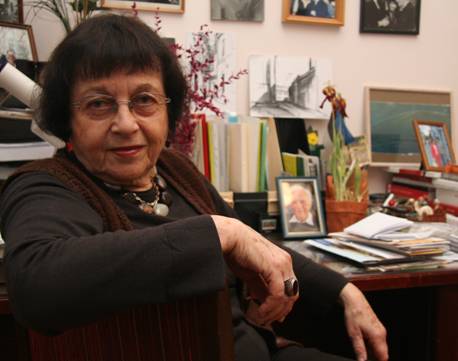
Professor Irena Veisaite
An Interview of Irena Veisaite by Ellen Cassedy April 26, 2011
Irena, you are a Holocaust survivor and have long been involved in Holocaust education initiatives in Lithuania. What do people outside Lithuania need to know about intolerance inside Lithuania today?
Of course there are examples of intolerance in Lithuania. All over the world there is intolerance. But there are also many attempts to promote tolerance in Lithuania. You should not always see only the negative side. We must appreciate positive steps as well.
What about the neo-Nazi march in Vilnius on March 11, independence day, and the swastika flags and anti-Semitic banner that appeared on Hitler’s birthday?
It is upsetting that this happened and that some young people joined that march. But it is also worth noting that both government and society at large reacted in protest against these incidents.
Lithuania’s foreign ministry and the Speaker of the Seimas, Dr. Irena Degutiene, reacted strongly against the anti-Semitic outbreaks on the day of Hitler's birthday. The reaction against the march on March 11 was not as strong and as far as I remember, it was mainly Kubilius who reacted.
There is always something growing. This makes me hopeful.
What is being done to promote tolerance in Lithuania, and what more should be done?
A great deal is being done. In a short interview it is impossible to mention everything. Just a few examples: When Lithuania declared its independence in 1990, there was almost nothing on this topic. Now we have about 60 books researching the terribly painful history of the end of Litvak history and culture in Lithuania. We have three books about the Roma Holocaust in the country. Our textbooks are changing toward openness and tolerance to Lithuania’s minorities, though they are not yet perfect. We’re educating our teachers, with the help of the US Holocaust Memorial Museum.
We also have many very active Educational Centers all over the country which are teaching the history of the Holocaust. A wonderful, modern exhibition has opened in the Museum of Tolerance in Vilnius Our government has designated 2011 as the Year of Holocaust Remembrance in Lithuania. Many events, discussions, conferences on this painful issue are planned.
For young people all over the world, the Holocaust is so remote that they can barely imagine it could happen. But we all need to learn about the Holocaust, not only because of the terrible things that happened, but because we need to understand that every one of us could in certain circumstances become a perpetrator. Every day we see how people are manipulated, how people are infected with hatred. As the famous Polish-British sociologist Zygmunt Bauman has stated in his book, Modernity and the Holocaust," the Holocaust is not a specific Jewish problem; it is a problem of modern society as a whole.
When we speak about the Holocaust in Lithuania or other Eastern European countries to people who also experienced the Gulag, we can’t ignore their experience. If we want to work toward mutual understanding, we must not become rivals as to who’s a bigger victim , but respect any victim of mass murder.
You have spoken of the need for "intolerance of intolerance." Can you explain?
No doubt. we should be intolerant of intolerance whenever and wherever it occurs. And we have first of all to apply it to ourselves. We can’t tolerate corruption, coercion, violence, etc. We have to fight it, but never overstep the border of tolerance. People are brought up differently, they live in different cultures and traditions, they have different experiences and therefore they can have different opinions and feelings, which have to be tolerated.
What can people outside of Lithuania do to help promote tolerance in Lithuania?
People from outside Lithuania should be very careful about interfering. They can speak of their own experience, but when a person from outside any country comes to teach local people how to act, you have to know the local situation very well and find the right way to speak. You must have tact. You have to understand the education people received, and their experiences. Otherwise you will face unexpected consequences.
Only one little example. In February, I attended a conference in London called “No Simple Stories,” which brought together well-known historians from the US, Israel, Germany, England, and Lithuania. We examined Jewish-Lithuanian relations – the years of coexistence and the years of violence. It was wonderful, very open and very honest. But at the end came a professor from outside with two cameraman, who read a statement which insulted all participants, accusing them in hiding the truth about the Holocaust in Lithuania. Such declarations don’t help, they only create bad blood and make a fair dialogue impossible.
Professor Irena Veisaite was a founder of the Open Society Fund – Lithuania and is now ombudsman of the Open Society Institute. For the past 15 years, she has participated in Holocaust education initiatives in Lithuania. She has been honored by the Lithuanian government with the Gediminas Order. The Sugihara Foundation nominated her as the Person of Tolerance in 2002. She lives in Vilnius.
 |
Ellen Cassedy traces her Jewish family roots to Rokiskis and Siauliai. Her book, "We Are Here: Memories of the Lithuanian Holocaust," will be published in March of 2012. She lives in Washington, D.C. Visit her website at www.ellencassedy.com. |
- Bookmark :
- Digg
- del.icio.us
- Stumbleupon
- Redit it
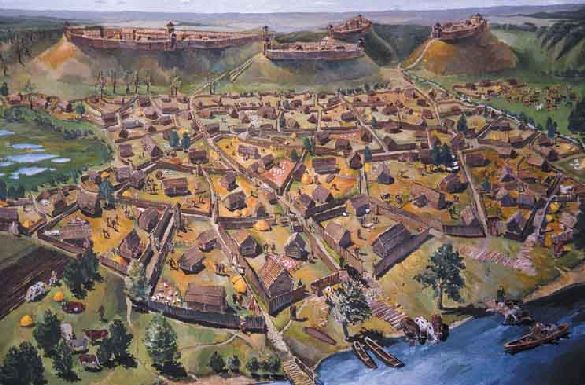
PICTURE: The castles and the town of Kernave (R. Sidrys). Kernavė is a unique 5 mounds complex, honoured as being the first capital of Lithuania. The first settlers appeared here as early as in 9th-8th millennium BC, in the Epipaleolithic period. Since then until the very Early Middle Ages, the territory was continuously settled by people who left their traces. In written sources Kernavė was first mentioned in 1279 in the Livonian Chronicle and the Herman Vartberg Chronicle, where it was described as Traidenis’, the Great Duke’s of Lithuania, estate (1269-1282). At that time Kernavė was the most significant economic-political centre of Lithuania. In 1390 Kernavė was burnt in an attack by Crusaders. After the fire the wooden town and castles have never been rebuilt.
The first people settled in the territory of Lithuania after the last glacial period in the 10th millennium BC. Over a millennium, the Proto-Indo-Europeans, who arrived in the 3rd – 2nd millennium BC, mixed with the local population and formed various Baltic tribes. The first written mention of Lithuania is found in a medieval German manuscript, the Annals of Quedlinburg, on 14 February 1009.
Initially inhabited by fragmented Baltic tribes, in the 1230s the Lithuanian lands were united by Mindaugas, who was crowned as King of Lithuania on 6 July 1253. After his assassination in 1263, pagan Lithuania was a target of the Christian crusades of the Teutonic Knights and the Livonian Order. Despite the devastating century-long struggle with the Orders, the Grand Duchy of Lithuania expanded rapidly overtaking former Slavic principalities of Kievan Rus’.
By the end of the 14th century, Lithuania was the largest country in Europe and included present-day Belarus, Ukraine, and parts of Poland and Russia. The geopolitical situation between the west and the east determined the multi-cultural and multi-confessional character of the Grand Duchy of Lithuania. The Lithuanian ruling elite practiced religious tolerance and borrowed Slavic state traditions, such as using the Chancery Slavonic language for official documents.
In 1385, the Grand Duke Jogaila accepted Poland's offer to become its king. He converted Lithuania to Christianity and established a personal union between Poland and Lithuania. After two civil wars Vytautas the Great became the Grand Duke of Lithuania in 1392. During his reign Lithuania reached the peak of its territorial expansion, centralization of the state was begun, and the Lithuanian nobility became increasingly prominent in state politics. Thanks to close cooperation, the armies of Poland and Lithuania achieved a great victory over the Teutonic Knights in 1410 at the Battle of Grunwald, one of the largest battles of medieval Europe.
After the deaths of Jogaila and Vytautas, the Lithuanian nobility attempted to break the union between Poland and Lithuania, independently selecting Grand Dukes from the Jagiellon dynasty. However, Lithuania was forced to seek a closer alliance with Poland when, at the end of the 15th century, the growing power of the Grand Duchy of Moscow threatened Lithuania's Russian principalities and sparked the Muscovite–Lithuanian Wars and the Livonian War.
The Polish–Lithuanian Commonwealth was created in 1569. As a member of the Commonwealth, Lithuania retained its institutions, including a separate army, currency, and statutory laws. However, eventually Polonization affected all aspects of Lithuanian life: politics, language, culture, even national identity. From the mid-16th to the mid-17th centuries culture, arts, and education flourished, fueled by the Renaissance and the Protestant Reformation. From 1573, Kings of Poland and Grand Dukes of Lithuania were elected by the nobility, who were granted ever increasing Golden Liberties. These liberties, especially the liberum veto (Latin for "I freely forbid"), led to anarchy and the eventual dissolution of the state.
During the Northern Wars (1655–1661), the Lithuanian territory and economy were devastated by the Swedish army. Before it could fully recover, Lithuania was again ravaged during the Great Northern War (1700–1721). The war, plague, and famine resulted in the loss of approximately 40% of the country's inhabitants. Foreign powers, especially Russia, became dominant players in the domestic politics of the Commonwealth. Numerous factions among the nobility used the Golden Liberties to prevent any reforms. Eventually, the Commonwealth was partitioned in 1772, 1792, and 1795 by the Russian Empire, Prussia, and Habsburg Austria.
The largest area of Lithuanian territory came under the control of Russia. After unsuccessful uprisings in 1831 and 1863, the Tsarist authorities implemented a number of Russification policies, including a ban on the Lithuanian press and the closing of cultural and educational institutions, and Lithuania became part of a new administrative region called Northwestern Krai. After the Russian – Turkey war in 1877–1878, when intervention of the German diplomacy withdrew from Russia fair winnings for the benefit of Turkey, the relationship between Russia and the German Empire became complicated. The Russian Empire resumed the construction of fortresses at its western borders for defenses against a potential invasion from Germany in the West. On 7 July 1879 the Russian Emperor Alexander II approved of a proposal from the Russian military leadership to build the largest 65 km2 (25 sq mi) "first-class" defensive structure in the entire state – Kaunas Fortress. Between 1868 and 1914, approximately 635,000 people, almost 20% of the population, left Lithuania. Large numbers of Lithuanians went to the United States first in 1867–1868 after a famine in Lithuania. Nevertheless, a Lithuanian National Revival laid the foundations of the modern Lithuanian nation and independent Lithuania.
LITHUANIA in the 20th century

The original 20 members of the Council of Lithuania after signing the Act of Independent Lithuania, 16 February 1918.
During World War I, the Council of Lithuania (Lietuvos Taryba) declared the independence of Lithuania on 16 February 1918, and the re-establishment of the Lithuanian State. During 1918-20 Lithuania successfully fought a war with newly independent Poland to defend its independence. At the end of 1920, however, Poland annexed Lithuania's capital city and province of Vilnius, which it held until World War II. For 19 years Kaunas became the temporary capital of Lithuania. Lithuania refused to have diplomatic relations with Poland until 1938 on the grounds that Poland illegally held the Vilnius region. After declaring independence, Lithuania also fought against the Bermondt-Avalov army, a German-sponsored group of military adventurers that sought to preserve German influence in the Baltic region, and against Russia. In November 1918, the Red Army invaded the country but ultimately was repulsed by the forces of the young Lithuanian government. On July 9, 1920, Soviet leader Vladimir I. Lenin signed a peace treaty with Lithuania, "forever" denouncing Russia's claims to the territory and recognizing the Lithuanian state.
From 1920 to 1940, independent Lithuania made great strides in nation building and development. A progressive land reform program was introduced in 1922, a cooperative movement was organized, and a strong currency and conservative fiscal management were maintained. Schools and universities were established (there had been no institutions of higher education and very few secondary schools under Russian rule), and illiteracy was substantially reduced. Artists and writers of the period produced works that have become classics.
In the early 1920s, Lithuania had a border dispute with Germany. The city and region of Klaipeda (Memel in German) had been under German rule for 700 years. Originally inhabited by Lithuanians, it was detached from Germany in 1919 by the Treaty of Versailles and placed under French administration. In 1923 Lithuanians organized an insurrection and took over the Klaipeda region. This region was ceded back to Germany after a German ultimatum in March 1939 stated that Germany would invade and take the region back by force if their demands were not met.
On August 23, 1939, Joseph V. Stalin and Adolf Hitler concluded the notorious Nazi-Soviet Nonaggression Pact (also known as the Molotov-Ribbentrop Pact). The agreement had a secret protocol that divided Poland, much of Central Europe, and the Baltic states between Germany and the Soviet Union. Lithuania, at first assigned to the German sphere of influence, in September was transferred to the Soviet Union. In October 1939, the Soviet Union forced on Lithuania a nonaggression pact that allowed Moscow to garrison 20,000 troops in the country. In return, the city of Vilnius, now occupied by Soviet troops, was granted to Lithuania. On June 15, 1940, Lithuania was overrun by the Red Army. At first a procommunist, so-called people's government was installed, and elections to a new parliament were organized. The elections were noncompetitive; a single approved list of candidates was presented to the voters. The parliament met on July 21, declared Soviet rule, and "joined" the Soviet Union as the Lithuanian Soviet Socialist Republic on August 6, 1940. The United States and many other countries refused to recognize the Soviet occupation.
Soviet rule brought about radical political and economic changes and Stalinist terror, which culminated in deportations to Siberia of more than 30,000 people on the night of June 14-15, 1941. Germany interrupted the Stalinist terror by attacking the Soviet Union on June 22, 1941.
The Lithuanian leadership went underground. An anti-Nazi resistance movement developed, publishing underground newspapers, organizing economic boycotts, and gathering arms. The resistance hoped that after victory the Western allies would insist on the restoration of Lithuanian statehood.
The nationalist Lithuanian resistance was supported by many Lithuanian political parties and resistance groups, including the Social Democrats and a coalition known as the Supreme Committee for the Liberation of Lithuania, which continued its activities many years after Lithuania was retaken by the Red Army. In 1943 this resistance frustrated German efforts at organizing a Lithuanian Schutz-Staffel (SS) legion. The Nazis responded by arresting Lithuanian nationalists and by closing universities. Moreover, occupation authorities succeeded, in the period 1941-44, in conscripting or capturing tens of thousands of people to work in Germany or to serve in the German military. Many perished in prisons or concentration camps. The main victims, however, were members of Lithuania's Jewish community. More than 200.000 Jews or almost 95 percent of the community's population, were massacred by Nazi squads.
Forcing the Germans out of Lithuania by 1944 the Red Army reestablished control and re-established the Lithuanian Soviet Socialist Republic. Sovietization continued with the arrival of Communist party leaders to create a local party administration. The mass deportation campaigns of 1941-52 exiled 29 923 families to Siberia and other remote parts of the Soviet Union. Official statistics state that over 120 000 people were deported from Lithuania during this period while Lithuanian sources estimate the number of political prisoners and deportees at 300 000. In response to these events an estimated 100,000 Lithuanian partisans fought a guerrilla war against the Soviet system. An estimated 30,000 partisans and their supporters were killed and many more were arrested and deported to Siberian gulags. It is estimated that Lithuania lost 780,000 people during 1940 – 1952. As a measure for Sovietization, Russification and industrial development Soviet authorities encouraged immigration of other Soviet workers especially Russians to Lithuania.
Soviet rule in Lithuania displayed well-known features of communist rule. The party had a monopoly on power, and the management of the economy was centralized. The regime collectivized agriculture from 1947 to 1951. Secret police terrorized the society and attempted to transfer Lithuanian nationalist loyalties to the communists. Deportations to Siberia were resumed. Religion was brutally suppressed. One Roman Catholic bishop was shot, one perished in prison, two died shortly after release, and two were banished for more than thirty years, leaving only one in office. Almost one-third of the clergy was deported, although survivors were allowed to return after Stalin's death in 1953. Eventually, the training of new priests was essentially stopped.
Underground resistance never disappeared, although the armed underground was destroyed. As a movement, resistance was first sparked by efforts to defend the Roman Catholic Church. After the Soviet invasion of Czechoslovakia in 1968, which led to increased repression in the Soviet Union, the dissident movement spread. In the 1970s, Lithuania had numerous underground publications. The most significant and regularly published among them was The Chronicle of the Catholic Church of Lithuania . It was never uncovered by the Soviet secret police, the Committee for State Security (Komitet gosudarstvennoy bezopasnosti--KGB), and was published for twenty years. In 1972 a young student, Romas Kalanta, immolated himself in protest against Soviet rule. Army units had to be sent in to quell a street rebellion by students that followed the self-immolation. The Committee for the Defense of Religious Rights and the Helsinki Watch Committee were established in the underground. Dissident work brought arrests and imprisonment. At the same time, the Lithuanian intelligentsia, especially writers and artists, demanded greater freedom of creative expression and protection of the Lithuanian language, traditions, and cultural values from the pressure of Russification that intensified during the administration of Leonid I. Brezhnev (1964-82).
The political and economic crisis that began in the U.S.S.R. in the mid-1980s also affected Lithuania and Lithuanians as well as other Balts offered active support to Gorbachev's program of social and political reforms. Under the leadership of intellectuals the Lithuanian reform movement Sajudis was formed in mid-1988 and declared a program of democratic and national rights winning nation-wide popularity. On Sajudis' demand the Lithuanian Supreme Soviet passed constitutional amendments on the supremacy of Lithuanian laws over Soviet legislation annulled the 1940 decisions on proclaiming Lithuania a part of the U.S.S.R. legalized a multi-party system and adopted a number of other important decisions. A large number of LCP members also supported the ideas of Sajudis and with Sajudis support Algirdas Brazauskas was elected First Secretary of the Central Committee of the LCP in 1988. In December 1989 the Brazauskas-led LCP split from the CPSU and became an independent party renaming itself in 1990 the Lithuanian Democratic Labor Party.
In 1990 Sajudis-backed candidates won the elections to the Lithuanian Supreme Soviet. On March 11 1990 its chairman Vytautas Landsbergis proclaimed the restoration of Lithuanian independence formed a new Cabinet of Ministers headed by Kazimiera Prunskiene and adopted the Provisional Fundamental Law of the state and a number of by-laws. The U.S.S.R. demanded to revoke the act and began employing political and economic sanctions against Lithuania as well as demonstrating military force. On January 10 1991 U.S.S.R. authorities seized the central publishing house and other premises in Vilnius and unsuccessfully attempted to overthrow the elected government by sponsoring a local "National Salvation Committee." Three days later the Soviet Army forcibly took over the TV tower killing 14 civilians and injuring 700. During the national plebiscite on February 9, 91% of those who took part in the voting (76% of all eligible voters) voted in favor of an independent democratic Lithuania. Led by the tenacious Landsbergis Lithuania's leadership continued to seek Western diplomatic recognition of its independence. Soviet military-security forces continued forced conscription occasional seizure of buildings attacking customs posts and sometimes killing customs and police officials.
On 4 February 1991, Iceland became the first country to recognize Lithuanian independence. After the Soviet August Coup, independent Lithuania received wide official recognition and joined the United Nations on 17 September 1991. The last Soviet troops left Lithuania on 31 August 1993 – even earlier than they departed from East Germany, which had not seen repression in recent times on the same level as the 1991 Vilnius massacre.
Lithuania became a member of the United Nations in 1991 and a full member of NATO and the European Union in spring 2004.
- Bookmark :
- Digg
- del.icio.us
- Stumbleupon
- Redit it
Postcards from the past
- Posted by - (4) Comment
Postcards collected by Stephanie Comfort, Texas, USA

Jewish market, Vilnius.
Stephanie Comfort, from Dallas, Texas, has over many years been an eager collector of old Jewsih postcards. Here is how she describes her ‘hobby’:
“I have the collecting gene: I collect dead Jews, their synagogues, their marketplaces and their family life - of the over 6,000,000 that were killed by the Germans and their countrymen "neighbours" there are few left to say Kaddish for them or to remember them. My Rabbi - Kenneth Roseman of Dallas once said that I am "Redeeming the Captives" by collecting the postcards and photos of them. I also collect and honour those few that saved them. In Lithuania it was the Japanese Consul to Lithuania, Chuin Sugihara, who was housed in Kaunas/Kovno (the Yiddish name) and although demanded to return with his family by the government of Japan he stayed and spent 24 hours a day - along with his wife - filling out visas which saved thousands of Lithuanian Jews. He was still filling them when on the train departing and throwing them out of the window. Upon his return to Japan he was removed from his position and never worked again. When the State of Israel discovered that they were destitute they paid them a yearly salary and educated his children. He - and other "Righteous Gentiles" (non-Jews) that saved Jews (proved via testamony) are honoured in the garden of Yad VaShem (Holocaust Museum) in Jerusalem, Israel by having a tree planted in their name.”
“I, myself, have visited Lithuania twice - stood in the Polnar Forest outside of Vilnius/Vilna and in the 9th Fort outside of Kaunas/Kovno and where the Kovno used to stand and where the Jewish patients, Jewish Nurses and Jewish Doctors were locked into the Jewish Hospital and set on fire and in front of the Sugihara home and was so very thankful to him and his family.”
“I was born in Brooklyn, New York to parents also born there BUT was also raised by maternal grandparents who came over from Russia, Poland - areas called The Pale or White Russia - today parts of the Ukraine. I was raised early on the stories of Pogroms .... my Great Grandfather was crucified during an Easter pogrom - nailed against a door. My Grandfather quickly grew a beard and came to the USA as his father. My Grandmother used to tell about the Christian peasants that used to "sic" their dogs on them in the fields where they walked and worked.”
“I have lived in Dallas, Texas for the past 44 yrs. although most of my schooling was in California. I have been a professional weaver - with one of my pieces being in the Dallas Museum of Art for a couple of months. I have been a jeweller - working primarily in gold with some silver and making jewelry and Judaica. During those years I also spent several months each summer in Israel studying Biblical Archaeology - called it sending Mother to Camp. For 4 seasons I worked in The City of David in Jerusalem and 2 seasons at Tel Dor on the Coast.”
“My husband and I travel a bit and about 15 years ago we went for the first time (there was also a second time) to the Camps in Poland: Auschwitz Birkenau, Treblinka, Madjanek and the killing fields in the towns with Ghettos. We stood in Budapest (3 visits) at the Danube where the Jews were tied 3 together so that only one bullet need be used. In the Czech Republic (3 visits) we've visited Theresenstadt/Terezin and in Lithuania (twice) the Polnar Forest and the 9th Fort. In Germany once it was Dachau and the Exposition Field where the Israeli Olympic wrestlers were killed in 1972. This all started me in collecting postcards of Jews that "were" knowing most of them were killed in the Holocaust not only by the Germans but ALSO by their fellow Lithuanians, Croatians, Latvians, Romanians, etc. etc. In fact it was only the Finns, the Danes, the Bulgarians, the Albanians and the Moroccans that were decent enough and brave enough to say NO.”
“Now with so many Holocaust deniers I fear that soon Europeans will start also denying that Jews ever lived in their countries - ergo - I document, document, document.”
“I think the story of how the Jewish Karaites were saved in Troki (Trakai) is interesting. When the German Commanded asked the Chief Rabbi of Vilna if they were also Jewish - his not liking the way they practiced their Judaism - said NO.”
“I was born during WW2 and remember the hushes when I would enter a room as a child - and the tears - and the names of relatives I would never know.”

Kaunas synagogue 1926.

Kaunas (Kovno) Chief Rabbi.


Jewish school 1926.

Jewish market, Vilnius.

Vilnius ghetto during World War II.

Vilnius, new synagogue.

Wooden synagogue, Žiežmariai (between Vilnius and Kaunas).

Old Vilnius synagogue.
- Bookmark :
- Digg
- del.icio.us
- Stumbleupon
- Redit it
- Posted by - (0) Comment
A brief chronology
2000 B.C. Lithuanian ancestors settle along the Baltic coast.
1009 A.D. Lithuania is first mentioned in chronicles. Lithuanians already have a reputation as fierce warriors.
1200 While much of Europe has already converted to Christianity, Lithuania is still pagan and will remain so for several hundred more years. Lithuanians believed fire embodies the divine. A sacred flameis kept at a Vilnius temple tended to by vestal virgins. If they break their vows of chastity or the flame goes out, the penalty is death.
1236 Lithuania is united by Mindaugas and later crowned king. Unification helps Lithuania fend off German crusaders.
1323 Vilnius founded by Grand Duke Gediminas.
1385 Polish-Lithuanian Union known as Kreva Union was sign. Lithuanian Duke Jogaila became Polish King.
1386 To keep the Germans at bay, the Lithuanian Grand Duke and Polish Queen wed, creating a monarchial union.
1387 The Christianization of Lithuania was initiated by the Grand Duke of Lithuania and King of Poland Jogaila with his cousin Vytautas the Great. This signified the official adoption of Christianity by Lithuania, one of the last pagan nations in Europe.
1392-1430 Lithuania-Poland stretches to the Black Sea.
1410 Lithuania, Poland and their allies defeat the Teutonic Knights and end their military influence in the region forever.
1400s Jews begin to settle in Lithuania. In time, Vilnius becomes a center of Jewish culture and learning in the world
1569 The Polish–Lithuanian Commonwealth. Lithuania enters a formal Commonwealth with Poland to help protect against increasing danger from Russia.
1657 The plague strikes and half the population of Vilnius die.
1795 The Commonwealth is partitioned by the Russian Empire, Prussia, and Habsburg Austria. Lithuania ends up controlled by Russia.
1860-1885 Lithuanian uprisings; The Emperor of Russia bans Lithuanian as an officially used language.
1900 Lithuanians begin emigrating en mass to escape Czarist persecution. The émigrés spread their influence far and wide. Among those who are either from Lithuania themselves or whose parents were: British actor Sir John Gielgud, singer Al Jolson, actor Charles Bronson, the Three Stooges, and American composer Aaron Copland. The father of former Israeli premier Ehud Barak was from Lithuania. Today, some 800,000 Americans claim Lithuanian heritage.
1918 Lithuania declares independence.
1920 After battling Russia and other powers, Lithuania secures independence. Poles occupy Vilnius; Kaunas becomes Lithuania’s provisional capital. Catholic Lithuania breaks relations with the Vatican after Rome recognizes Polish rule over Vilnius.
1920-1939 Lithuania prospers financially, culturally and in education.
1939 In March, a long-running dispute between Lithuania and Germany over the jurisdiction of Klaipeda comes to a head when Berlin demands that Lithuania give up the coastal city, or face a Nazi invasion. Lithuania, figuring it couldn’t depend on support from either Russia or any Western powers, gives in to the ultimatum. On March 22, Hitler arrives in Klaipeda.
1939 In August, Hitler and Stalin carve up Europe, with the Baltics in the Soviet sphere. Before, the Baltics were able to play Germany and Russia off each other, but they’re now virtually within U.S.S.R. occupies Lithuania; mass deportations to Siberia begin. Moscow hands Vilnius back to Lithuania.
1940 Soviet Army occupies Lithuania. Mass deportations to Siberia, forced exile, jailings and executions begin.
1941 Nazis occupy Lithuania. Most of Lithuania’s 240,000 Jews are killed.
1944 Soviets occupy Lithuania again. Over 500,000 Lithuanians are either deported, forced into exile, jailed or shot
1987 First open protests against Soviets.
1989 Lithuanian Communists vote to break with the Soviet Party, a daring and dangerous move at the time.
1990 Lithuania declares independence, the first Soviet republic to do so.
1991 Soviet crackdown kills 13 civilians in Vilnius; in August, after a failed Kremlin coup, Lithuania wins independence.
1993 Algirdas Brazauskas becomes president. The litas become the new national currency.
1997 A cooperation agreement is signed between Russia and Lithuania.
1998 Lithuanian born and now a U.S. citizen, Valdas Adamkus becomes a president of Lithuania after a 50-year exile.
March 29, 2004 Lithuania is accepted into NATO.
May 1, 2004 Lithuania joins the European Union.
- Bookmark :
- Digg
- del.icio.us
- Stumbleupon
- Redit it

Photo: Andrius Ambramavičius
Užupis is an urban area of Vilnius characterized by dilapidated buildings, courtyards and side streets that haven‘t been renovated for decades. But when the music reverberates over the cobbles in the late evenings I am convinced that you will fall in love with this unique part of Vilnius city. Užupis was declared as independent Republic in 1997. The atmosphere – filled with love, music, smells and happy people – will certainly catch your soul. When you at late night again cross the river Vilnia I think you’re going to do it with a big smile and renewed appreciation of the exceptionally many exciting adventures and stories Lithuania has to offer…
Text: Rasa Mekuškaitė
13 years ago the Republic of Užupis declared its independence. It’s easy to get there; Užupis is located right in the centre of the city, just a few hundred meters from Vilnius Old Town. Vilnia River prominently separates its territory from the rest of the city. Cultural, artistic and political representatives, engineers, students and the unemployed all combine to unite this small district in the capital of Lithuania. There you can meet all kinds of people – millionaires as well as beggars became an inseparable part of Užupis district.
As every district of the city Užupis also has its own lifestyle. However, the newcomers, who came to Užupis some 15-20 years ago were accepted by the current inhabitants in a very unfriendly way – like a colonists, says Romas Lileikis – film director, bard and president of the Republic of Užupis. Nonetheless, despite worries, those young and creative people sincerely tried to befriend the locals. “You have to break your inner barriers without any outside influence” Romas explains.
Today the Republic of Užupis is well known and attracts daily arriving newcomers and tourists. Indeed, establishment of Užupis was a hard task to do. The founders haven’t received any financial support from the government or private money investors.
Everything starts with an idea. Someone had drawn a map of Užupis, and then someone created the flags (different colors for each season of the year) and a completely new calendar marked with some unique holidays and dates, known nowhere in the world but in Užupis. An open hand with a round hole in the middle of the palm on white background was chosen to be a symbol of Užupis. Also an authentic constitution of 41 articles (only 4 of them didn’t start with the word “human”) was written.

Photo: Rasa Mekuškaitė
If you simply ask an inhabitant of Užupis (užupietis), or someone who loves this Republic what Užupis means to them –after a few minutes of consideration the answer would be – “Užupis is a . . .“ It’s mystic atmosphere and space, ancient history, an abundance of greenery, compatibility and accessibility and finally it’s cultural bohemian charm attracts people to visit this lovely place.
If someone wants to become an “užupietis” (that’s how inhabitants of Užupis are being called in Lithuanian) he didn’t have to memorize a constitution, be an artist or meet any other requirements. “One simply has to wade through the river and reach the other bank. It should come from the inside” Marius Abramavicius Neboisia (an old Užupis dweller and artist) shares his thoughts. While traveling to Georgia he even wrote in his memoirs that “an užupietis remains užupietis even in Georgia”. Nobody can force you to become the citizen of this republic and nobody can take it back from you.
All people who live here – from creative artists to enterprising businessmen – share the same opinion that Užupis is not their property “We’re creating it, but we don’t own it”. All the interested newcomers are becoming a natural part of this atmosphere. You may observe the changing names of resident artists and photography studios or the names of stores but the creative breathing remains the same.
One of the most important symbols of the Republic of Užupis (and of Vilnius as well) is a sculpture of an angel blowing a trumpet. It has an interesting history behind its origin. When artists began settling here they’ve decided that was important to have their own herald. The enthusiasm was so strong that the idea grew despite the fact that they didn’t have any funds.
The creation of Angel sculpture was exclusively funded by local dwellers. Firstly, they created an obelisk with a giant nest egg on the top of it. Today, when asked about the sculpture local teenagers say “Oh! The Angel has to be come out of an egg”. Finally, after five years the dream became reality and the angel is blowing his trumpet towards the West, towards the Old Vilnius. Usually this place has predominantly western winds, so somehow it is a play of words which shows us that everything is possible.
Also, a miniature copy of an Užupis angel was given to the President of Lithuania Valdas Adamkus on his inauguration day in 1998 as a gift from Užupis.

Photo: Rasa Mekuškaitė
A few years after, Republic officials decided to refuse keeping an army. “The army won’t protect us if heaven will refuse to do so” the President Romas Lileikis says. He also briefly comments that if we want to understand the world, we have to start out from ourselves and to struggle with aggression not from the outer side, but from the inside. The main following point is that talented people change other people into talented ones too. He also accents that it is very important to be a personality if you want to be together. Furthermore, social community will help you whenever you need it, whether you’re happy or sick, or seeking for mercy, or simply want to share your ideas and thoughts. Success is the most important gun of the nation, declares Romas.
One of the first European centers of alternative art Užupis Art Incubator (as it calls UMI) and its gallery “Galera” were founded in 1996 by a group of young and initiative Vilnius Art Academy students and local artists. This impressive building has beautifully painted walls, and is decorated by ground sculptures, wall sculptures and a monumental stone dedicated to the “Unknown teacher”. Nearby, in the yard, there are several embankments artistically strengthened with concrete and stones. Local ducks often use the smallest harbor in Europe (located in Užupis of course) for swimming and quacking around. That is why they have chosen an emblem of drake on it. A decade ago various art projects, festivals and avant-garde fashion shows took place here among the ruins of the Second World War. Today Užupis Art Incubator has become a new home for craft workshops, exhibitions and various live music venues.
Užupis has many resemblances to the famous bohemian district of Paris Montmartre (both have an uphill location, for instance). However, Užupis’ desires to stay unique is stronger than its wish to be called the Lithuanian equivalent of Montmartre.
The Republic of Užupis proclaimed its independence on April 1st 1998. Užupis’ Independence Day has become an important event to celebrate in a whole Vilnius. More and more tourists from all over the world are coming here to feast the Independence Day, so there are always lots of visitors and representatives of foreign media. Foreigners share their impressions and memories about Užupis with their friends so they all keep returning here when they get a chance. Back in 1998 the ambassadors of foreign countries who resided in Vilnius at that time also honored the newly proclaimed Republic on that special occasion by driving in their cars, trimmed with country flags around the main streets of Užupis.

Photo: Rasa Mekuškaitė
Traditional process of releasing fishes into the water of Vilnia River is also a part of Independence Day celebration. A long parade accompanied by brass band with themed slogans and posters walks along the streets, and then a special live concert concludes the celebration.
A famous U.S. film-maker, one of the activists of the 20th century Fluxus art movement and Lithuanian expatriate Jonas Mekas was claimed to be the first honorable citizen of the Uzupis Republic. A year ago, on the 1st of April, 2010 a Jonas Mekas pedestrian alley was solemnly opened there. The alley’s path goes along the main Užupis Street towards the Vilnius Art Academy, where you may see the roof topped bridge on the Vilnia River which was named by Jurgis Mačiūnas – George Maciunas (pioneer and author of the Fluxus idea). His Holiness the 14th Dalai Lama of Tibet and a former mayor of Bogotá Antanas Mockus (son of Lithuanian immigrants who has been a candidate for the presidential election in Colombia in 2010) are among the most famous visitors of Užupis.
Užupis’ New Year’s Day (so called a Trap Day) is celebrated on the day of the spring equinox (20th of March) and is coincident with astronomical spring and Earth Day. On that day much attention is paid to human addictions of material and spiritual background. All people are invited to purify themselves, to burn their old sins in the bonfire and symbolically wash themselves in the River’s water.
The Day of the White Tablecloths is celebrated on the second day of Easter at the Užupis café terrace. Everyone there exchanges greetings and food from their Easter meal. It doesn’t matter whether it is a sunny warm day or a snowy one. Indeed, covering their meals from falling snowflakes is the main attraction for those who came there. Everything fades behind a feeling of belonging to a community.
First planned as Fall Harvest day celebration has later become a regular weekly based natural foods and flea market in the Tymo block area.
Usually on Saturdays all bridges of Užupis are being attended by the married couples, because according to tradition the bridegroom has to carry his bride across the river. About 10 years ago a new interesting custom of ‘locking a padlock and throwing away the key’ has been adopted there. The newlyweds are affixing padlocks with engraved initials/date/wishes to the railings of the bridges and then throwing the key into the flowing river. If someone would take a closer look onto these almost new looking padlocks one may see that they were left by those couples, who recently celebrated their 10th wedding anniversary.

Photo: Rasa Mekuškaitė
After long negotiations with municipal committees and representatives of the People’s Republic of China a small park on the Malunu street, not far from oldest Vilnius electrical substation, has been named the Tibet Square.
The street name Malunu (Malunas – mill) is originated from old watermill on the Vilnele river which was a source of energy for a former paper factory. The area always had plenty of manufacturers. Since the Middle Ages a potter guild, a glass foundry and a forge were established here by local craftsmen.
Currently nearby in Angel square you may find clay workshops that keep traditions of Lithuanian heritage alive. There you may find professional artists renewing old tile estate stoves or leading craft workshops.
During the firewood market days when the weather gets colder, some people buy firewood for their pauper neighbors so that they can also warm their dwellings. There are still many homes at Užupis (which remains one of the oldest districts in Vilnius) that use firewood for heating. However, little by little everything changes and now the majority of residents use gas-fired boilers or electricity for warming up.
Wind Days are being celebrated in November. One more time, everything is dedicated to creation and creativity. Traditional poetry readings became an alternative to famous Lithuanian poetry festivals such as Spring Poetry or Poetical autumn of Druskininkai. Days of poetry are always accompanied by live music of different genres (dance, jazz, choral music) and young singers from Vilnius and Užupis. Directors of non commercial cinema present their movies here also during the Wind Days.
The Užupis café (located nearby the main entrance to Užupis) remains the most important spot for meetings of the Parliament of the Republic. Some very important questions are being considered here. There you can meet the ministers and the premier of the Republic of Užupis – Sakalas Gorodeckis and the finance minister Algimantas Mačiulis (he is also responsible for administering užas – a local currency). The minister of culture is Virginijus Paldavičius, who is also known for making craft boats with symbol of Užupis on its sail. One of the brightest personalities in Užupis is a minister of Foreign Affairs – Tomas Čepaitis. Usually he gives ministers their portfolios or decides who can perform their duties without portfolios. It should be noted that Republic of Uzupis has approx. 250 ambassadors and 100 consuls across the world. The Minister T. Čepaitis divides them into serious and non-serious ones. This depends on where the man feels in his own place and what he knows best.
First ambassadors in foreign countries were chosen to be Andrey Antonov in Byelorussia, Marius Abramavicius Neboisia in Tibet, Vytenis Rasutis in Georgia and Alfredas Maruška in Nepal (and of Esperanto as well). Also, agencies of Užupis were established in some EU countries. Usually the mayors of main Lithuanian cities are becoming ambassadors of Užupis automatically.
Non-serious ones represent various parts of life (from information technologies to chocolate). If sand and fog are important for you – you are welcome, half-jokingly says Tomas Čepaitis.
Sometimes Užupis is compared to Monaco and Liechtenstein duchies. Also this little Republic keeps creative diplomatic dialogues with Christiania (a similar Republic in Dresden), Žižkov (district of Prague), and odd micronations of Ladonia (Sweden) and Freedonia (Slovenia). By the way, Užupis has almost 7000 inhabitants.
All in all, it is not important whether you are looking upstream or downstream. The polygenesis is like a constant, odd drama for all the progressive ideas. During the warm summer days young people who come to sit there by the river say “Watching the flowing water never bores you”. The river channel surrounds Užupis from the three sides like a horseshoe or caring hands; every thought is feasible.

- Bookmark :
- Digg
- del.icio.us
- Stumbleupon
- Redit it
VilNews e-magazine is published in Vilnius, Lithuania. Editor-in-Chief: Mr. Aage Myhre. Inquires to the editors: editor@VilNews.com.
Code of Ethics: See Section 2 – about VilNews. VilNews is not responsible for content on external links/web pages.
HOW TO ADVERTISE IN VILNEWS.
All content is copyrighted © 2011. UAB ‘VilNews’.

 Click on the buttons to open and read each of VilNews' 18 sub-sections
Click on the buttons to open and read each of VilNews' 18 sub-sections 








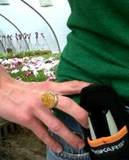


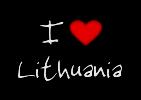


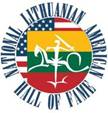




















.jpg)



